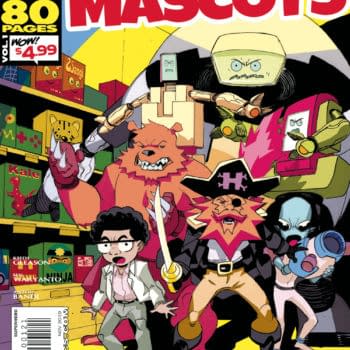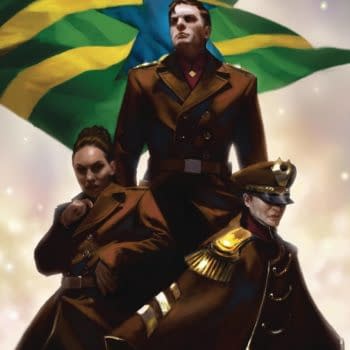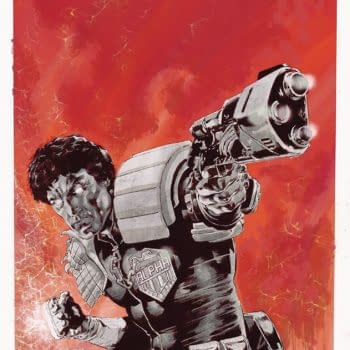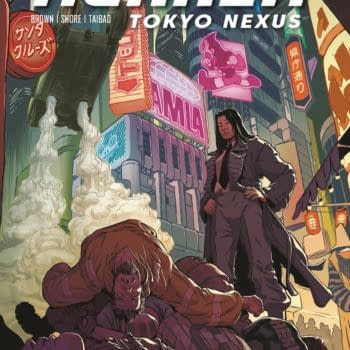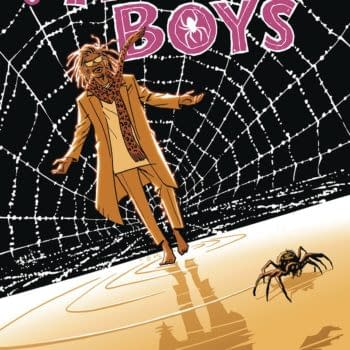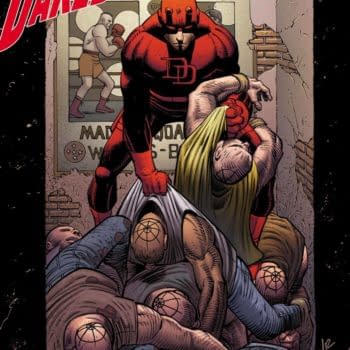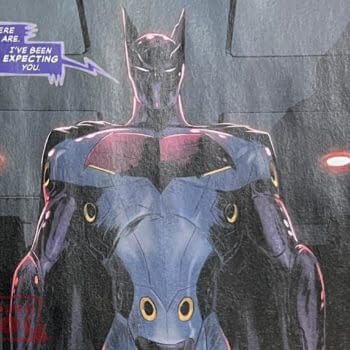Posted in: Comics | Tagged: black panel, Comics, comics code, entertainment, michael davis, michaeldavis, milestone
Code Black 2: Shutout by Michael Davis, From The Edge

Although closeted in the interim report of the comic book hearings, race was not an issue that America really wanted to deal with, and perhaps that above all is why race had been given little more than a nod in the hearing.
Race was, however, one of the major reasons that 2.5 million Black Americans registered for the draft between 1941-45. They hoped that by helping their country win the war, the United States would at last make the "Four Freedoms" a real part of their lives, and not something they had to aspire to.
Freedom of speech and religion and freedom from want and fear were offered to every American by President Franklin D. Roosevelt in one of the greatest speeches in the history of the United States of America. Black people were well aware that those freedoms were not being offered to us. Enlisting and fighting in World War II was going to change that, or at least that's what a great many Black people believed or wanted to believe.
Japan was wrong for attacking America at Pearl Harbor.
Four years later, when America dropped an atomic bomb on them, Japan realized just how wrong they were. Some people think that the first atomic bomb was more than enough to convince the House Of The Rising Sun they had made a big mistake. I'm one of them. I think the first A-bomb was to end the war — the second bomb was for Pearl Harbor.
Before Fat Man and Little Boy taught Japan that final lesson, Japanese propaganda ridiculed America's so-called Great Society by pointing out the hypocrisy that existed therein. They pointed to the exclusion of Black players from baseball, the national pastime, as proof of that hypocrisy.
Japan was indeed dead wrong when they attacked us, but about how the "land of the free" treated some of its citizens?
About that, they were dead right.
The "Great Society" that was America, where "all men are created equal" and where "land of the free, home of the brave" originated, was anything but to Black people in the United States. Other American ideals such as opportunity, rights, liberty, democracy, and equality were a rallying cry from America to the world before, during, and after the war, were then and sometimes even now denied to people of color.
Baseball has been the national pastime almost since the first ball was thrown out at the first game. Nothing says America like baseball. Japan's propaganda and racial injustice aside, WWII saw the best of America.
The war produced many heroes, and books and films that were created based on those heroes continue to thrill the American public.
During World War II, there were plenty of Black heroes, but even today those heroes are slow to be recognized. As late as 1993 there were no Black Medal of Honor recipients, and the award did not become official until rectified in 1997 when Bill Clinton awarded the medal to seven African American World War II veterans — only after an Army-commissioned study that showed clear racial discrimination in the awarding of medals.
Perhaps with an acknowledged Black hero from the war, the civil rights struggle would have been given the push that could have garnered patriotic pride in the county. That hero and subsequent push may have given way to much-needed awareness that Black individuals were just as American as the next guy.
Unfortunately, the war ended without a Black well-known war hero, and as such it would not be the event in American history that would level the playing field for Black people.
It turned out that event was an actual playing field, and that Black hero was Jackie Robinson.
I'd be interested to know which fact more Americans are aware of: Christopher Columbus for being the Italian who discovered America or Jackie Robinson for being the first Black player to play professional baseball.
Most of you reading will be interested to know both of those great Americans truths are not true.
More than 50 Blacks managed to play on white teams: John "Bud" Fowler was the first when he joined a white professional team in New Castle, Pennsylvania in 1878.
Being able to 'play' was clearly a double edge sword.
Making a living as a Black man playing a game must have surely been a dream come true in an era when having a career, and not just a job, was a dream realized by very few in the days following the Civil War. To many, having any income and not just trying to live off the land was a godsend.
However, post-Civil War America when Blacks were 'freed' was anything but the Promised Land that Blacks thought it would be.
In the south, lynching Black people was not only a possibility, but in some states at some time, it was an assurance.
Blacks had little to protect themselves with while playing a game that was ripe with racism and danger for most, if not all of them. Some players made it a habit to carry a Bible with them as comfort.
To a majority of African Americans, God was much more than just something to worship. God was a reason to hope (pray) equality was not just a distant dream. For African American slaves, the only saving grace that could be embraced with little fear of outrage from their masters was their God.
Faith has always been the foundation of African American culture — that's why the vast majority of leaders in Black America are from the church.
It's not known if Bud carried a Bible; however, what is known is Bud is credited with inventing the first shin guards. White players were spiking him so often that he began to tape pieces of wood to his legs to protect himself.
Upon his arrival, many considered Jackie Robinson a savior of sorts. His arrival on the world stage would help lift them out of the bondage of separate but clearly unequal treatment.
In baseball, at least thanks to Jackie Robinson, the racial tide was shifting however slowly.
The end of the golden age of radio and the advent of the age of television helped usher in this ebony knight in shining armor.
Much like the early days of baseball, an African American making a living at the beginning of the comic book business would have been a dream come true.
Jackie Robinson's story is a perfect parallel for African Americans in the comic book industry. Robinson was championed by Branch Rickey, a white man who believed America should be the land of equal opportunity it said it was. The battle over Blacks in comic books was also championed by a white man — his name was William Gaines.
The battle for Blacks in baseball took place in a very public arena.
The battle for Blacks in comics was not public, but it was just as important.
And just as brutal.
End Of Part 2


